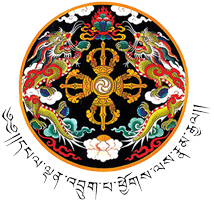Dzongkhag Tshogdue
The Dzongkhag Tshogdue Sector of Samtse Dzongkhag co-ordinate and facilitate the conduct of DT Session leading to effective and efficient DT Session with mass participation in decision making.
Backgroud
In continuing, with decentralization process, after establishing the National Assembly in 1963, Dzongkhag Yargay Tshogdu (DYT) was established, to formulate, approve and implement gewog and dzongkhag plan activities, by delegating the responsibility to decide on the development priorities of the individual Dzongkhag and empowering the decision making at the grass roots level in 1981. These reforms were aimed at encouraging citizens to participate in the process of decision-making. DYT was renamed as a Dzongkhag Tshogdu, after formation of constitutional parliamentary democracy in 2008; the parliament passed the Local Government Act of Bhutan 2009 on September 11, 2009 based on the provision of the constitution.
Dzongkhag Tshogdu, as a highest decision making body in the Dzongkhag, it shall comprise of a Gup and Mangmi as a representative from each gewog and one elected member from Dzongkhag Thromde and Dzongkhag Yenla Thromdes. The Dzongkhag Tshogdu session is Chaired by the DT Chairperson and Dy. Chairperson in the absent of Chairman from the elected DT Members. DT session is conducted once in every six months and special seating was conducted during emergencies.
Under Local Government Act 2009, Chapter 16, Local Government Office is established as a Dzongkhag Tshogdu Secretariat supported by a Dzongkhag Tshogdu Secretary, who is a civil servant. The functions of Secretariats under LG Act 2009, Chapter 16, 235 and 236, the secretariat office should provide secretarial support to LG and provide advice to LG members. The LG office shall coordinate DT sessions, record minutes and follow up the resolution and report in the DT sessions. Moreover, the office of DT secretariat is also responsible to look after the administration and management of LG members and safekeeping of records of Documents. Under Chapter 19, section 293. The Chairperson of LG has to submit an annual report to the government consist of the annual financial statements and a statement of LG’s objectives and policies.
SOP for the conduct of the Dzongkhag Tshogdu (DT) Session
Mandate: To co-ordinate and facilitate the conduct of DT Session.
Outcome: Smooth flow of DT Sessions in effective and efficient.
Purpose: Effective and efficient DT Session with mass participation in decision making.
Authority: DT Chairperson/ Dy. Chairperson.
Responsibility: DT Member, Sector and Regional Heads as an observer.
Procedure (as per Chapter 7, of the LG Act 2009)
- Meet at least once in every six months for regular and thrice in case of special sessions during emergencies.
- The Chairperson of the LG shall confirm the sessions and upon confirmation of date of the sessions under section 98 of the LG Act 2009, issue notification under section 107 of the LG Act, inviting proposal from the members for inclusion in the agenda.
- Upon receiving the notification, the members of LG should call for Zomdu in their respective constituencies.
- Advertise for the publicity for the conduct of DT.
- Compile and draft the agenda submitted by Gewog and Sectors before the actual conduct of DT.
- Screen out the agenda by Screen out committee.
- Circulate the final agenda to all the DT members, concern sectors and observers.
- Co-ordinate DT sessions and record minutes of the deliberation of the DT.
- Submit the draft minutes to Thrizin for finalization and endorsement of the final minutes.
- Circulate and follow up for implementing status of DT resolution.
- Reporting the DT follow up in the next sessions.
- DT Sector takes responsibilities of all secretarial services to the LG elected members. The secretarial functions are as follows :
- Office Orders
- Leave
- Remuneration and Benefits
- Updating Personal files
Downloads
Nothing to download in this sector.
Staff





